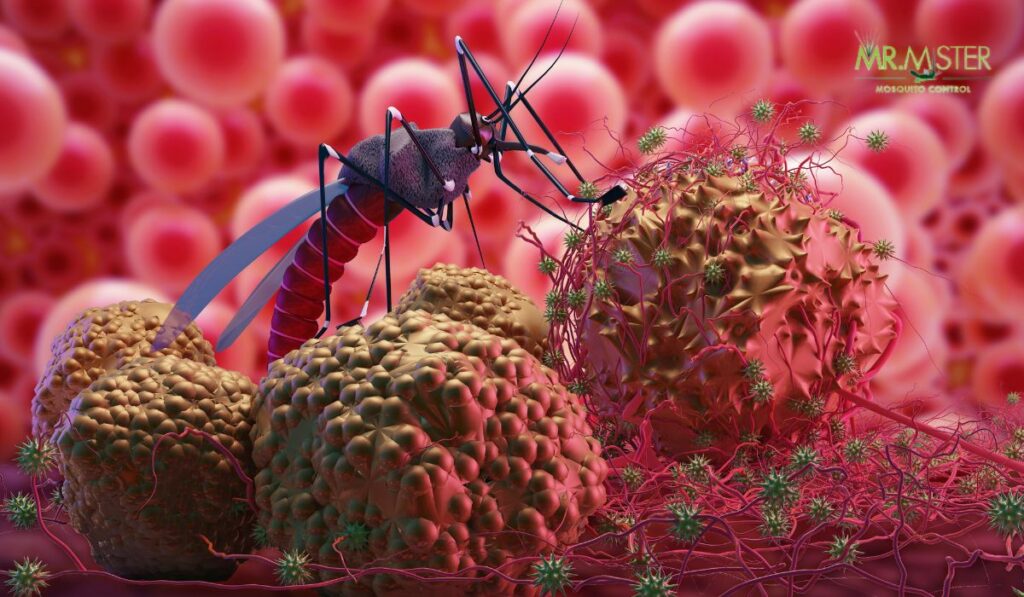4 Mosquito Borne Illnesses You Need To Be Aware Of
The facts don’t lie: Mosquitoes cause more human illnesses than any other organism on the planet. Over one million people die worldwide each year from mosquito-borne diseases alone, making these sometimes foolishly overlooked pests a deadly epidemic.
Not only do mosquitoes carry illnesses that can affect humans, they also pose health risks to pets — such as dogs, cats and horses. This is why finding effective solutions for mosquito control is imperative to leading a healthy lifestyle for you and your family.
When it comes to mosquito control, the first step is understanding just what, exactly, these deadly pests can do to your health. Here’s 4 mosquito-borne illnesses you should be aware of:
Mosquito-Borne Illness Number 1: Malaria
With its origins traced to Africa, Malaria is one of the deadliest ancient illnesses to still exist in today’s society. The culprit? Mosquitoes.
The female mosquito transmits the Malaria parasite — known scientifically as plasmodium — through a mosquito bite. A person infected with the Malaria parasite will typically experience fevers, chills and sweating, which usually occurs within the first few weeks of being bitten.
Thankfully, through many mosquito control techniques, Malaria has not been much of an issue for Americans. However, those who travel to countries — typically with tropical climates — known for Malaria outbreaks are prone to either catching the disease themselves or bringing it back with them. This is why you should always receive the proper vaccines prior to leaving the country.
Mosquito-Borne Illness Number 2: Chikungunya
Transmitted primarily by the Asian Tiger mosquito and the Yellow Fever mosquito, Chikungunya is known as a pathogen that causes excruciating joint pain that is not only debilitating, but comes without any existing cure.
Although the disease isn’t known to be fatal, Chikungunya is extremely painful and, if left untreated, it could leave you bedridden for weeks.
Chikungunya cases have been popping up in recent years in the US, primarily in Florida, which had 2 known outbreaks in 2014 and the CDC has since feared its spread to travel destinations like the US Virgin Islands as well as Puerto Rico.
Mosquito-Borne Illness Number 3: Heartworm
If you own a dog or cat, you’re likely taking every step to keep them safe from anything that could cause harm. Heartworm is not only deadly, but because it’s spread by mosquitoes, it’s one of the easiest illnesses for your pet to catch.
The disease itself is known as a roundworm; a parasite that infects the lungs and heart of a dog or cat, causing extreme discomfort and could even lead to death due to congestive heart failure. This is why it’s majorly important to keep your pets up to date on their heartworm vaccines and take extra measures to control mosquitoes around your yard.
Mosquito-Borne Illness Number 4: Zika Virus
By now, you’re likely aware of Zika Virus and the epidemic its become in recent years. 2016 had the highest cases of Zika outbreaks in the US on record, and with the statistics only growing, there’s not much hope for a Zika-free 2017 either.
Zika Virus has origins in Africa, but has since made its way to America where its been terrorizing citizens in major cities like Atlanta, Miami and even New York.
Someone who is infected with Zika Virus will typically experience flu-like symptoms, as a result of Zika Fever which is part of the illnesses natural cycle. Anyone infected with Zika should seek immediate medical attention.
We hope you’re finding our Atlanta Mosquito Control blog helpful and informative! For more information on what makes Mr. Mister Atlanta’s premier provider of innovative mosquito control solutions and techniques click here. Or, visit our Testimonials page to see what some of our satisfied customers are saying.
Conclusion
Mosquitoes, seemingly innocuous, carry a significant burden of disease, affecting both humans and pets alike. These pests are vectors for numerous life-threatening illnesses that can leave a trail of suffering in their wake. From ancient diseases like Malaria to modern epidemics like Zika Virus, the impact of mosquito-borne illnesses is far-reaching.
FAQs
Are all mosquito species carriers of diseases?
No, not all mosquitoes transmit diseases. Only certain species, known as vector mosquitoes, are capable of transmitting pathogens that cause diseases in humans and animals.
Can mosquitoes transmit diseases to animals other than pets?
Yes, mosquitoes can transmit diseases to a wide range of animals, including livestock and wildlife, contributing to ecosystem imbalances and affecting biodiversity.
How can I protect my pets from mosquito-borne illnesses?
Keeping your pets up to date on vaccinations, using mosquito repellents specifically formulated for pets, and managing mosquito populations in your environment can help protect them from diseases.
What are some effective mosquito control methods for homes and yards?
Removing standing water, using mosquito repellents, wearing protective clothing, and employing professional pest control services are effective methods to control mosquito populations around homes.
Can mosquito-borne illnesses be transmitted from person to person?
Some diseases, like Zika and Dengue, can be transmitted through sexual contact or from a pregnant mother to her unborn child. However, most mosquito-borne illnesses are primarily spread through mosquito bites.
Are there vaccines available for all mosquito-borne diseases?
Vaccines are available for some mosquito-borne diseases, such as Yellow Fever and Japanese Encephalitis. However, vaccines for diseases like Zika are still in development.
Do all regions have the same risk of mosquito-borne diseases?
The risk of mosquito-borne diseases varies based on factors like climate, geography, and local mosquito populations. Some areas may have a higher risk due to favorable conditions for mosquito breeding.
Can I contract multiple mosquito-borne diseases at the same time?
It’s possible to be infected with multiple mosquito-borne diseases, although it’s relatively rare. However, the presence of one disease can potentially weaken the immune system, making individuals more susceptible to other infections.
Are there any natural repellents that effectively deter mosquitoes?
Some natural repellents like citronella, lemon eucalyptus oil, and neem oil can help deter mosquitoes. However, their effectiveness may vary, and professional repellents are often more reliable.
Can mosquito control efforts significantly reduce the risk of outbreaks?
Yes, effective mosquito control measures, such as reducing breeding sites and using insecticides, can help minimize mosquito populations and thereby reduce the risk of disease outbreaks.
What role do government health organizations play in controlling mosquito-borne diseases?
Government health organizations provide information, guidelines, and resources for controlling mosquito-borne diseases. They also conduct surveillance and respond to outbreaks to prevent their spread.
How does climate change impact the spread of mosquito-borne diseases?
Climate change can affect mosquito habitats and distribution, potentially expanding the range of disease-carrying mosquitoes and increasing the risk of outbreaks in new areas.
Can community participation contribute to effective mosquito control?
Yes, community involvement is crucial for successful mosquito control efforts. Reporting mosquito breeding sites, adopting preventive measures, and supporting local initiatives can collectively reduce mosquito populations.
* Schedule a Free Mosquito Control Consultation – 404-941-0720 *
* Guaranteed Results * 100% Biodegradable * Locally Owned







